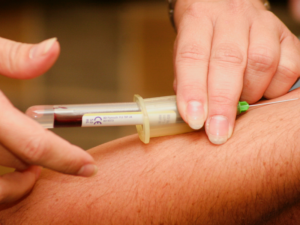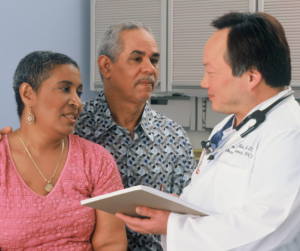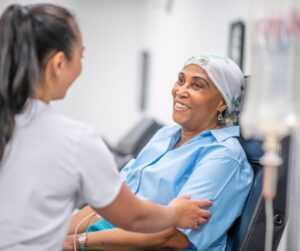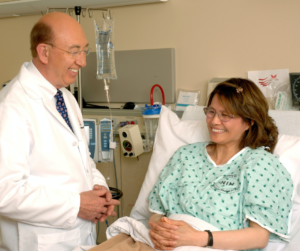The Oncology Connection
Sexual health is affected by every type of cancer, not just cancers involving the reproductive organs, and it is affected by every treatment modality—surgery, radiation, hormone therapy, and chemotherapy. Yet sexual health often is not discussed with patients with cancer.
According to Emily E. Gehron, DNP, CRNP, AOCNP, a nurse practitioner at Penn Medicine Lancaster General Health in Lancaster, Penn., there are many reasons why sexual health in patients with cancer is not addressed.

From the patient’s perspective, the cancer takes precedence: patients don’t want to burden their health care providers, and they accept disruption as part of their cancer outcome. They may be too embarrassed to mention it, and, if it was important, wouldn’t their provider have mentioned it?
On the provider’s side, there may be issues of time, embarrassment, and lack of training. If it was important, wouldn’t the patient have mentioned it? Sometimes the clinician’s own belief system may keep them from discussing the issue of sexual health as well.
Gehron was one of the speakers at the Horizon CME Advanced Practice Provider Oncology Summit in Philadelphia, in November 2022, where she spoke about her experience developing a sexual health program for patients with cancer. She shared a quote from Sharon L. Bober, PhD, founder and director of the Sexual Health Program at Dana-Farber Cancer Institute in Boston, who sparked her interest in developing a sexual health program for patients with cancer: “If intimacy is different from the way it was before cancer, and it is causing distress, then it deserves care.”
“If it’s important to patients—and it won’t be important to everyone—we should be addressing it and doing our part as providers to screen for these issues,” Gehron said.
She said that addressing sexual health in patients with cancer is part of a holistic approach to patient care. It can be addressed while a patient is undergoing treatment for cancer as well as within a survivorship clinic. She emphasized that sexual health care covers both the physical aspects of sexual intimacy as well as the psychosocial aspects.
“You say sexual health and people think the physical act of sexual intercourse, and it’s not just that,” she said. “it’s really the full intimacy aspect of relationships, not just the reproductive organ cancers or the physical act of intimacy itself. Many of our cancer treatments can cause interruptions in intimacy whether it’s from fatigue or caregiver strain.”
Getting Started
In developing the sexual health and cancer program at Lancaster General Hospital, Gehron started small, providing informational brochures and referrals. Since her practice was focused on female patient populations in gynecology and breast oncology, the program was initially geared toward women. She and her colleagues hope to be able to expand their program to male patients with cancer. She said it’s important to consider non-binary programs and concerns within the LGBTQIA community as well.
“It’s important to have the support from your institution or practice,” she said. She educated her administration on the need for sexual health screening for patients as advocated by National Comprehensive Cancer Network’s (NCCN) guidelines for survivorship. “Everyone agreed this was a need we had to address,” she said.
“It can be as easy as making sure that within specific cancer patient populations, you are at least asking the simple NCCN survivorship questions to make sure you have appropriate resources in place for patients,” Gehron said. Information on sexual health and cancer is available from the American Cancer Society, NCCN, and patient advocacy organizations.
Lancaster General Hospital’s sexual health program is slowly growing, according to Gehron. “We have all the referrals in place that patients would possibly need—counseling, urogynecology, urology, gynecologic oncology, generic gynecologic health care, pelvic floor therapy, physical therapy—which are very convenient for patients.” Her institution is building a wellness clinic for cancer survivors and sexual health will be incorporated into the survivorship clinic.
As part of her research to develop the program, Gehron contacted institutions with successful sexual health clinics to learn about their programs. She consulted Memorial Sloan Kettering Cancer Center’s female sexual health program in New York, N.Y., and Virtua Sexual Wellness and Pelvic Health, based in Voorhees, N.J. “Both were extremely helpful in letting me know how they started up their program, as well as what organizations they used for training and the screening questionnaires they used for patients. They also provided treatment recommendations as well,” she said.
Gehron believes that advanced practice providers (APPs) are ideally suited to addressing the sexual health of patients with cancer. “We tend to have the luxury of having more time with our patients in visits to address these issues, and when it comes to the surveillance survivorship model, we tend to do most of these visits, so we are accustomed to addressing the entire aspect of patient care in oncology from screenings and follow-up of treatment-related side effects to psychosocial aspects,” Gehron said. “I think APPs have formed more close relationships with patients and that makes addressing some of these more intimate issues easier for us versus the physician.”
Communication
There are several models that can guide clinicians in communicating with patients about sexual health; however, they all include the importance of first asking the patient for permission to address the issues. Typically, Gehron will begin by asking the patient, “This may be a difficult topic. Are you okay if I ask you these questions? Are you okay with everyone that’s in the room and addressing it openly?”
It’s also important to allow for time for patients to communicate their concerns and for the clinician to provide resources or direction for patients. “If you are going to ask the question, make sure you have some form of an answer, whether it’s you personally addressing it or saying, ‘You know, I’m not sure. Let me get back to you,’ or ‘Let me find those resources and I will get them for you.’”
For more information
American Cancer Society. How Cancer and Cancer Treatment Can Affect Sexuality. https://www.cancer.org/treatment/treatments-and-side-effects/physical-side-effects/fertility-and-sexual-side-effects/how-cancer-affects-sexuality.html
National Comprehensive Cancer Network®. NCCN Clinical Practice Guidelines in Oncology (NCCN Guidelines®) Survivorship. Version 1.2022. Accessed December 15, 2022. https://www.nccn.org/professionals/physician_gls/pdf/survivorship.pdf







